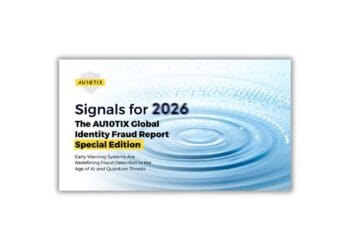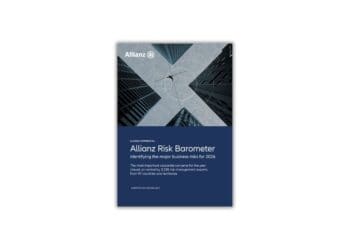Russ Berland considers disruptive risks – like the earthquake and resulting tsunami that caused the Fukushima disaster in 2011 – and how AI can help to identify and manage those risks before they mature into overwhelming obstacles.
In March 2011, an 8.9 magnitude earthquake and a 23-foot tsunami hit Japan. Thousands of Japanese people tragically lost their lives, and hundreds of thousands of people were forced to relocate away from the crippled Fukushima nuclear power station.[1]
At the same time, the quake sent its own shockwaves throughout the supply chain of the auto industry. Japanese production of Honda and Toyota vehicles was suspended, but so were the electronic chips and boards that appeared in cars made throughout the world. General Motors was forced to suspend production of pickup trucks in its Shreveport, Louisiana assembly plant due to parts shortages. And other U.S. manufacturers, Ford and Chrysler, took weeks to steady out their parts supplies to keep production lines going at normal rates. In retrospect, it was evident that these car manufacturers were too dependent on the region of Japan that was affected by the quake and tsunami, but a car has thousands of parts; how can a business know what will affect its supply chain and its ability to continue to do business when there are so many things in need of our attention?
In our supply chains, we are dependent on others to provide our businesses’ inputs: raw materials, parts, equipment, tools, supplies. We need everything from paper clips to toilet paper to make our businesses run, but we face risks in our supply chain.
Questions to Determine Risk in the Supply Chain
- Quantity: Can the supplier provide goods and services in sufficient quantities to meet our needs? Have we forecast our needs accurately?
- Quality: Do the goods and services meet our requirements, and are those requirements set at a level to add value to our business processes? Are there any defects in the goods or services that could harm people, property or the business?
- Costs: Is the cost of the goods and services sufficiently low to allow our business to operate profitably? Will the cost of the goods or services increase to become uneconomic to continue to purchase?
- Reliability and Timing: Will the supplier provide what they have promised whenever my company needs it and in the form in which we need it? Will my company get the value it expects and is paying for? Will the goods be transported properly and arrive intact? Is the supplier in good financial health to continue to provide the goods and services we need?
- Compliance: Are any laws or regulations being violated in obtaining these goods and services? Is there any fraud in the transactions? Is there anything about the way in which the goods and services are provided that violates basic human rights or would cause damage to the company’s reputation?
- Flexibility: Will changes in demand or technology substantially change our supply chain needs? Will we overcommit in contracts to take too many products or pay too much in a price-declining environment?
In attempting to answer these questions, we are often left with an incomplete set of tools. With respect to quantity, we could meet with a supplier’s salespeople and ask questions about capacity and current and forecast demand. We could possibly visit a strategic supplier’s production facilities to see for ourselves what they are making and how much we think they could make. With respect to quality, we could pull a few samples and test them ourselves to determine whether they meet requirements. We could ask to see the suppliers’ certifications, such as ISO 9001. With respect to costs, we could negotiate and contract to get the lowest possible prices and lock those prices in for some time in the future.
Each of these tasks is limited in several ways. It requires that a person pay attention to an issue for an invested period of time. Pick up the phone. Send an email. Fly to a supplier location. Review trade magazines and web information. When a person watches one thing, they disregard others. How do they know what to pay attention to? And what will be the event or decision that will trigger a crisis in your business’ supply chain? Who knew that the Japanese quake and tsunami of 2011 would force multiple auto plants around the world to shut down for lack of critical parts? Who knew that the Hanjin global shipping line was on the brink of financial collapse in 2016 and its bankruptcy would disrupt supply chains globally?[2] Or that a volcano in Iceland in 2014 would cripple air commerce in Europe for weeks?[3]
Enter Artificial Intelligence
Artificial intelligence relates to using information resources (such as computers) to view data and answer questions. While we have all been entertained (and frightened) by stories of armies of Terminators and SkyNet, real artificial intelligence is much more mundane; it simply uses data to answer questions. Artificial intelligence, also known as machine learning, can analyze images of handwriting and, using its computational power and some clever algorithms, tell us if the swishes on the check form a “2” or a “3” or a “5.”[4] Or it can analyze the color values and location of pixels in an image to tell us if the picture is of a dog or a cat. The computer does not “know” what it is doing in the same way we are self-aware of our own thoughts when we try to read someone’s handwriting or see if the animal in the distance is a dog or a cat,[5] but AI can be trained to be adept at identifying patterns, even if it does not think like we do.
Can artificial intelligence help us to manage risk in supply chains?
In 1998, Professor Wilding at the Centre for Logistics and Transportation at the School of Management, Cranfield University in the U.K. famously applied chaos theory to supply chains. According to Professor Wilding,
“The term chaos has been used to describe the seemingly random disorder of customer demands for products and … to describe disorganized, yet responsive business structures that rapidly adapt and gain competitive advantage. Chaos is also used as a metaphor to describe how a small change can be amplified to have a large effect on the system. This has resulted from the popularisation of the ‘butterfly effect,’ where a butterfly flapping its wings creates tiny changes in the atmosphere that result in the creation of a tornado a few weeks later.”[6]
While AI in its present form was not available when Professor Wilding wrote his paper, it turns out that AI is very good at finding chaos in systems like supply chains.[7]
Artificial intelligence can help us to monitor vast stores of data and spot the patterns that lead toward supply chain risks maturing into real consequences. Here are a few AI tools that can help us to focus on the patterns that lead to “tornadoes” without our having to focus on every single “butterfly:”
- Predictive Analysis: These AI programs can help predict customer orders and supply chain requirements and help to schedule maintenance activities and stockpiling to prevent business downtime.
- Strategic Optimization: These AI programs help businesses decide where to locate facilities, inventory and resources.
- Supplier Reliability: These AI programs can analyze supplier activity, such as late shipments or quality issues, to spot trends in supplier reliability – flagging the need to review or change suppliers.[8]
- Augmented Real-Time Decision-Making: These AI programs take vast numbers of potential options for decisions and narrow them down to a few key decisions in a short period of time.[9]
- Fraud Detection: These AI programs review transactions and spot those that are outside of normal patterns or that violate rules or policies.[10]
- Regulatory Compliance: These AI programs review transactions, transportation activities, contracts, laws and regulations to spot activities that are outside of normal patterns or that violate rules, policies or laws.
- Contract Review: These AI programs review proposed contracts to make sure they are consistent with your own contract policies and risk appetite.[11]
- Legal Research: These AI programs can conduct deep legal research and provide relevant statutes, regulations and case law that apply to your legal questions.[12]
AI could have identified the critical supply vulnerabilities for the car companies in 2011 before they happened…[13] What risk “butterflies” are here right now and yet escape our focus because there are so many potential butterflies demanding our attention? With the new set of tools AI brings, we should be better equipped to focus our limited time and attention on real risks, spot the developing risk patterns and anticipate, make decisions and take action before they turn into tornadoes (or tsunamis).
[1] https://www.truecar.com/blog/the-aftermath-how-japans-automotive-industry-is-surviving-a-tragic-trifecta/
[2] https://www.supplychain247.com/article/supply_chain_disruption_the_bad_the_ugly_the_future
[3] Id.
[4] https://www.crn.in/ai/deepquanty-artificial-intelligence-labs-announces-the-launch-of-its-first-product-snapchek/
[5] https://www.sparkcognition.com/2018/08/27/math-about-cats-dogs/
[6] “Chaos Theory; Implications for Supply Chain Management”, International Journal of Logistics Management, Vol 9, No 1, pp 43-56, 1998 available at https://dspace.lib.cranfield.ac.uk/bitstream/handle/1826/2721/Chaos%20_theory_implications_for_SCM.pdf?sequence=1.
[7] https://www.quantamagazine.org/machine-learnings-amazing-ability-to-predict-chaos-20180418/
[8] https://www.forbes.com/sites/forbestechcouncil/2019/04/18/why-turn-to-artificial-intelligence-to-monitor-your-supply-chain-compliance/#5cd11bea215f
[9] https://www.cioreview.com/news/artificial-intelligence-for-effective-supply-chain-management-nid-27979-cid-78.html
[10] https://securityboulevard.com/2019/05/using-ai-and-ml-to-win-against-fraud/
[11] https://techcrunch.com/2018/04/17/lawgeex-raises-12m-for-its-ai-powered-contract-review-technology/
[12] https://abovethelaw.com/2019/05/ross-intelligence-offers-a-new-take-on-legal-research/
[13] Together, a geographic analysis of supply chain sources with game theory modelling of impacts on temporary impairment of supply regions could have shown this issue before it occurred. Of course, AI tools were not generally available in 2011, so this would have been a targeted and exhaustive calculation. See https://www.forbes.com/sites/cognitiveworld/2019/03/15/how-ai-can-and-will-predict-disasters/#16cf61235be2



 Russ Berland is a seasoned leader who creates value in an organization by leading high-performance teams in law, compliance and risk management. He works with innovative, multinational organizations and has achieved measurable and timely results in the areas of law, compliance, strategic planning, international business and risk management. As an engineer and former federal court law clerk, he achieves business objectives and solves problems via deep experience, innovation with sound judgment and effective and efficient management of people, resources and costs. Russ is Chief Compliance Officer of
Russ Berland is a seasoned leader who creates value in an organization by leading high-performance teams in law, compliance and risk management. He works with innovative, multinational organizations and has achieved measurable and timely results in the areas of law, compliance, strategic planning, international business and risk management. As an engineer and former federal court law clerk, he achieves business objectives and solves problems via deep experience, innovation with sound judgment and effective and efficient management of people, resources and costs. Russ is Chief Compliance Officer of 






